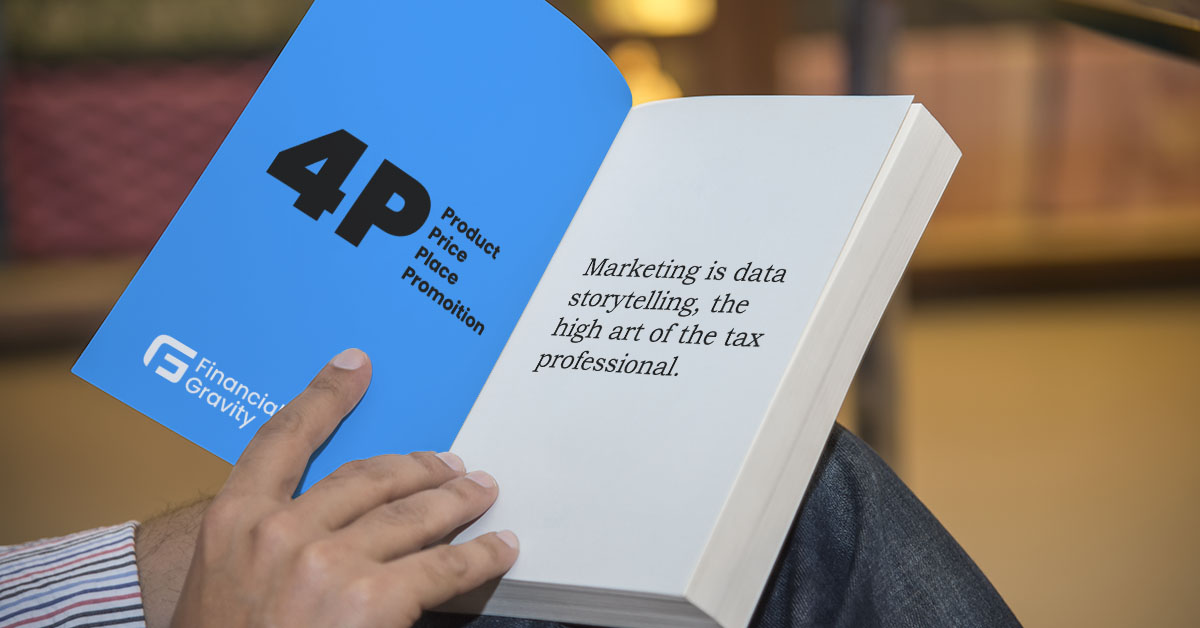CPAs and EAs are, by trade and education, masters of data analysis. Some become fluent in the arcane art of data storytelling, which techtarget.com defines as “the process of translating data analyses into understandable terms in order to influence a business decision or action.” These skills are absolutely vital to the sophisticated realms of commerce, governance, and conflict resolution.
Unfortunately, this disciplined approach to decision-making too often acts as a brake on CPAs marketing their services and growing their businesses. Tax professionals typically see marketing as a language art, but in reality, marketing, when done properly, is actually mostly science.
In this blog, I’ll break down marketing as a scientific discipline and provide some tips for tax pros who want to build a thriving business and a valuable brand.
CPAs Who Understand How the 4 Ps Interoperate Will Gain A Massive Advantage
First, let me introduce the concept of the marketing mix. The term was coined in 1949 by Neil Borden, a professor of advertising at the Harvard Graduate School of Business. Borden’s idea was based on the fact that marketers are, essentially, “mixers of ingredients.” In 1960, Jerome McCarthy, also at Harvard GSB, dubbed the mix “the 4 Ps” for product, price, place, and promotion.
Although few people have ever heard of either Borden or McCarthy, their contributions to the science of marketing earn them a place in the pantheon of business development. The marketing mix and 4 Ps have been foundational to business school pedagogy for over half a century. It’s hard to imagine a textbook or marketing course that does not include a survey of the 4 Ps. It is to advertisers what Anatomy is to physicians.
In my experience, CPAs and EAs spend virtually no time considering their marketing mix. However much time they spend thinking about their brand, even a cursory examination of their 4 Ps, which can be assessed in mere minutes, tells a data-driven story about their business. To make all this more approachable, an accountant might take comfort from thinking of each of the 4 Ps as a financial asset. It would not be a crazy idea to consider that your marketing mix is actually the sum total of your business’ worth:
- Your product is what you exchange for dollars in the marketplace
- Your price is the objective value of your product’s worth to its consumers, both in absolute terms and relative to all other competitors and substitutes
- Your place, for most tax pros, is your office location, but in reality, it’s actually mostly virtual. Your place may be more properly thought of as a 5th P, your position.
- Your promotion is equal to your brand equity. You could think of it as your growth engine.
Let’s think through each of these and consider how you can make these assets more valuable by planning for growth based entirely on your marketing mix. It’s important to note here that you already have a marketing mix, whether or not you’ve ever even considered it. Every business in the world has a marketing mix.
CPAs Can Eliminate One Million Competitors With A Thoughtful Marketing Mix
For some tax professionals, their mix is made up almost solely of product and price, with no thought given to place, position, or promotion. That’s their mix, for good or ill. It’s been my observation that tax pros who have been thoughtful about their marketing mix have larger, faster growing, more profitable and more valuable businesses.
I would assert that 100% of the Top 100 firms pay close attention to their marketing mix. Here’s something to ponder: did these firms become among the 100 largest before or after they got intentional about their marketing mix?
Before we go further, let’s keep things in context. Given the nature of tax compliance work, competition must always be a critical part of the equation. Accounting per se can never be a monopoly business. According to zippia.com, there are well over one million accountants employed in the U.S.
Competition is not the only contextual consideration. There is also your customer, and your company. Keeping these three constituents top of mind is crucial to implementing positive change. For example, if you choose to change your product mix, you will be changing your competitive environment by default. If you seek to serve a different type of customer, for example move from B2C to B2B, you will necessarily need to make some changes to all 4 Ps. And if your goal is significant growth, you’ll need to think about your team and resources.
Let’s begin with product. Can you state in one, short, declarative sentence, what your product is? If not, here are some questions that may help you zero in: Whom do you serve? Who is your product for? What features and benefits does it deliver? Perhaps most importantly, what problems does it solve? Many reading this will personalize the answers; this is what I deliver, these are the problems I solve. This implies that you are the product, and there’s nothing inherently wrong with that, just understand that a marketer will have to sell you, not your firm, your offers or your value proposition.
Here’s a product exercise. Did you start your business thinking everyone needs accounting help, and I will be a diligent and honest accountant, or, did you ask yourself “what would make accounting better?”, or “how can I make the experience of working with an accountant different?”
For most tax pros, they themselves are the product. They embody reliability, thoroughness, accuracy, and most of all, trust. Those are all good things, but it can lead to a fifty-way tie for first place in your town. Another good exercise, if you want to grow your business, is to visit the websites of your competitors.
Price is the biggest challenge facing marketers in a business with few differentiators. TurboTax offers to not just to help you with your taxes, but to do them for you, and to “get you every dollar you deserve”, for $409. Why would a rational consumer pay more than that?
I’m sure you have an answer. Whatever that answer is, go back up to product and do the exercises again. Whatever differentiates you from TurboTax is a decent answer for product. If you can’t think of anything concrete, you probably should plan on your fees moving down eventually to $409. There will be a floor; all commodities eventually find their floor, the point of minimal profitability. This is the natural action of capitalism, what Hegel, and then Marx, wrote about.
Price is the key to productivity. The exercise for price is simple: are you selling your time, or the value you provide? If you’re basing your fees on hourly rates, you’re selling time. That’s not necessarily a bad thing; there are attorneys that charge thousands of dollars per hour, and surgeons who charge $7,000 for a two hour procedure. That kind of thing is probably not on offer for an accountant, however.
You begin to see the power of the mix. Product and price are absolutely related. If, for example, your product were advice, and not tax prep, you can charge based on the impact of that advice. Here’s an example: your client has $1 million invested in stocks and bonds. A 5% return makes them $50,000 pre tax. If your advice produced a 7% net return, you’ve just added $20,000 to $45,000 per year to their net worth in one year. Would that not be worth a 1% annual fee? Now your $409 tax prep client is a $10,409 total revenue client, and you spent very little actual extra time on the account.
The obvious takeaway is to add advisory services to your tax compliance business. I recommend you begin now to think about how to accomplish that, and I can add this incentive: it is virtually certain that some of your clients would love to get their advice from you, and not the salespeople they work with now. In any normal distribution, a large percentage, and possibly most, of your clients will be dissatisfied with the advice they’re getting.
Place, for accountants, typically translates as “office location”, and may mean considerations like signage on the building, traffic patterns, proximity to business and commercial centers, and the like. But let me challenge that with a question: have you ever surveyed your clients about your office space? Do you know what they value about it? Do they even care at all? In my experience, the single most important thing about your location is whether or not there’s free parking.
You may feel that you simply must have office space, if only to separate your home and office lives. TurboTax does not have offices, although HR Block does. You may also believe you need space for filing cabinets and a copier and a supply closet, but do you? How much does that space cost?
I suggest you begin to think about place as an entirely virtual thing. Do you really need paper? The most common answer I get to that question is “Well, I don’t need paper, but many of my clients insist on it.” In that case, I recommend you set a firm date to go 100% paperless, and remind you that paperlessness is a virtue. You’re saving the planet. You’re also saving a bunch of money, and not just on paper. A paperless office is far more productive. My firm is 100% paperless, and I’ve never felt more productive or secure.
Having a virtual place means your clients can be literally anywhere. You won’t be limited to the driving distance from your client’s home. I live in Marin County, California, and for the past 20 years my accounting firm was in New York and then Phoenix. I’ve never visited their offices, and if they didn’t have an “about us” page on their website, I would have no idea what they even look like. Maybe it’s just me, but I don’t care about any of that. What I care about is reliability, thoroughness, timeliness, tax smarts, and to a very small degree, price.
Now, the mix is getting interesting. Suppose you decide your product is “We serve the dental community with a deep and empathetic understanding of dental practices, particularly those who plan a transition in the coming twenty years.” There are dentists in every city and town in America, and in my experience they are very concerned about taxes. The opportunity to add value with tax and financial planning advice, including sophisticated risk management strategies, is immense.
Eventually, your digital place will become more important than your physical location. Your website should become your principal place of business, and that means it’s not just a place to find out about you, but to work with you. Clients should be able to upload and download directly from your website. Your billings and collections should become entirely web-based. Email and chat can replace the telephone, providing another productivity advantage for you. So you should begin to consider how you will evolve your digital presence into a powerful tool for managing your business, not just your marketing.
Next-level thinking would lead to the question: how does my digital presence change my product, and therefore my price? Now, we’re entering the realm of the “marketing mixologist.” Do you begin to see how intentionality can change everything?
CPAs: Create A Category Of One To Gain Market Share
Finally, there is promotion. This is the most delicate area for the tax professional, who cannot, and must not, veer over into selling. How do you promote without selling? There are examples all around you. How do hospitals, clinics, non-profits, architects, and donee organizations develop?
They educate and inform. They explain the why and how of what they do. They say how they are different without calling out their competitors. They position themselves as true fiduciaries, working only for the best interests of their clientele. But most importantly, they communicate.
You will want to use the social platforms to promote your business. You should spend the time it takes to create a powerful profile on Linkedin. This is not terribly difficult, and Linkedin has lots of tools to help you. Get a professional portrait photograph. Join several industry groups and post content that they will see. Linkedin and your website will do your heavy lifting from a consumer due diligence perspective.
FaceBook, at least for now, is also a critical social platform. A large percentage of your clients have FaceBook accounts, and if they follow you—which will often happen because you follow then—they will encounter you and your life very frequently. All those encounters build your brand awareness, what I call your mindshare. You will want your current and prospective clients to have access to the content you publish.
The great news about social media is its combination of reach and ultra-low cost. Invest in your website, and then extend your website messaging through the social media platforms. It’s a powerful, low cost and very effective way to promote your business.
The 4 Ps, your marketing mix, is essential to your business development. I hope this article has got you thinking about intentionality and the importance of being the architect of your own future. Tax professionals occupy a unique position in the financial services world, and have amazing opportunities—if they can get their mix right.
At Financial Gravity, we provide an agency marketing service for our Family Office Directors. If you would like to learn more about our offer, you should watch The Multi-Family Office Difference or read my book, Winning the Wallet Share War. (It’s free and you get four copies: e-Book, audiobook, digital interactive book, and hardcover).















